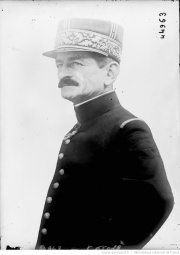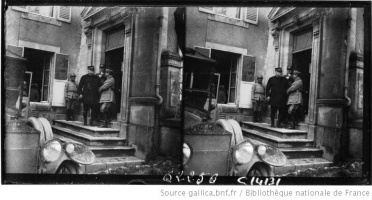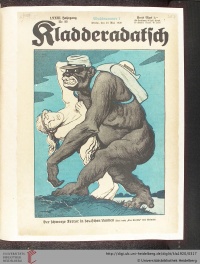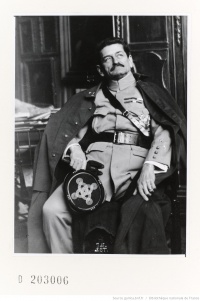A Colonial Officer↑
Coming from the French officer school Saint-Cyr, Charles Mangin (1866-1925) decided to serve in the colonies, specifically in French Sudan, as a marine infantry officer in 1890. Ardent in combat, he fought against African leaders like Samory Touré (ca.1835-1900). He became famous and was chosen by Captain Jean-Baptiste Marchand (1863-1934) to accompany the Congo-Nile mission in 1898.
The Idea of a “Force Noire”↑
Contrary to popular belief, Mangin’s army project, the “Force Noire”[1] (“Black Forces”), was not designed for the Great War. The idea resulted from the Russo-Japanese War (1904-1905), which revealed to officers that the next war would be a war of the masses. Convinced that he must find enough soldiers, Mangin was very interested in the “Force Jaune” (“Yellow Forces”), which was a project defended by French officers in Asia. Back in Africa in 1907, Mangin developed a project that rejected the segregationist U.S. army model but was inspired by the British colonial theories on “martial races”. He also sought to make the project compatible with the French Republic, for example by promoting colonial troops in the French army. He did so by limiting possible promotions to the grade of captain. Thus, he developed a racialising vision that considered African soldiers as combat-capable and saw them as a pool of men from which to recruit.
Role in World War I↑
When the war began, Charles Mangin came back to France. He was given command of the 5th Infantry Division (August 1914-June 1916), with which he won the Battle of Charleroi. With the 11th Army Corps (June-December 1916), he took Fort Douaumont on 24 October 1916. As commander-in-chief of the Sixth Army, he was dismissed after the failure of the offensive of the Chemin des Dames while being accused by the Senegalese deputy Blaise Diagne (1872-1934) of “massacring” the black troops. Yet he quickly returned to lead troops in December 1917, assuming control of the 9th Corps, then taking command of the 10th Army (June-November 1918), with which he led the great offensive of July 1918 that would upset the Germans. After the war, he was responsible for the Senegalese riflemen occupying the Rhineland. During this time the soldiers were subjected to significant racism and were referred to as “Schwarze Schmach” (“black shame”) by the German population. Contrary to Mangin’s will, the high command could do little against this.
Julie d'Andurain, École Militaire / Paris-Sorbonne
Section Editor: Alexandre Lafon
Notes
- ↑ Mangin, Charles : La Force noire, Hachette 1910.
Selected Bibliography
- D'Andurain, Julie: La genèse intellectuelle de la Force noire, in: Buton, Philippe / Michel, Marc (eds.): Les troupes coloniales et la Première Guerre mondiale, Paris 2018: Vendémiaire.
- Duroselle, Jean-Baptiste: Préface, in: Mangin, Louis-Eugène: Le général Mangin, 1866-1925, Paris 1986: F. Sorlot, pp. 9-14
- Lunn, Joe Harris: 'Les Races Guerrieres'. Racial preconceptions in the French military about West African soldiers during the First World War, in: Journal of Contemporary History 34/4, 1999, pp. 517-536.
- Mangin, Charles: La force noire, Paris 1910: Hachette.
- Michel, Marc: Les Africains et la Grande Guerre. L'appel à l'Afrique, 1914-1918, Paris 2003: Karthala.











